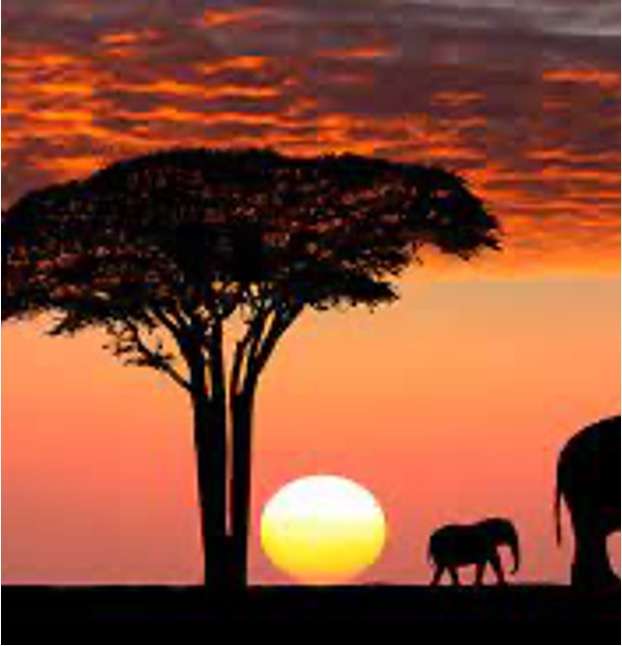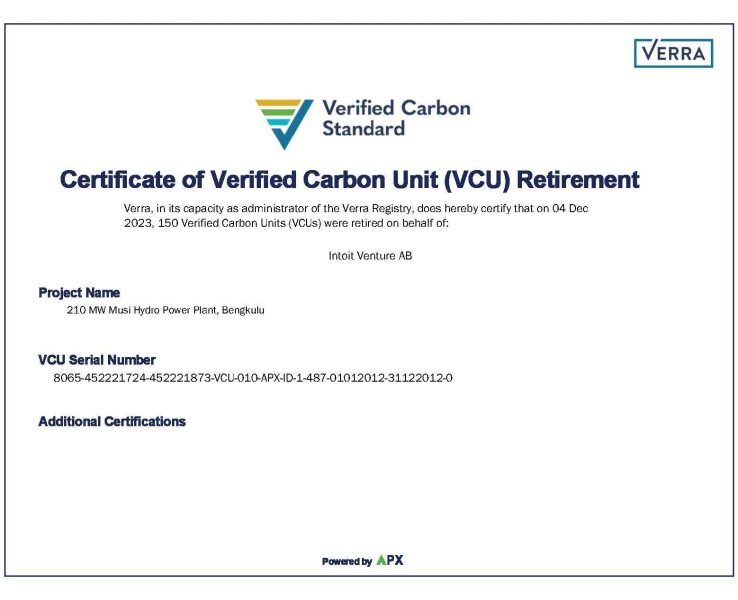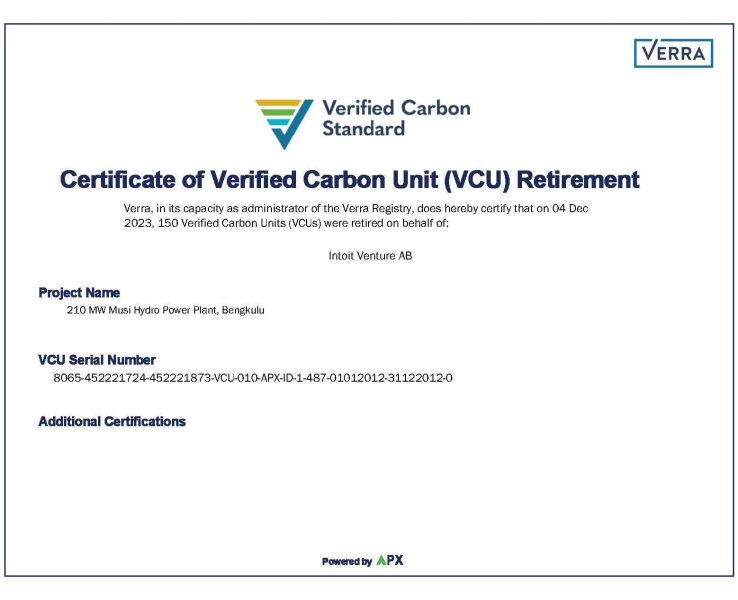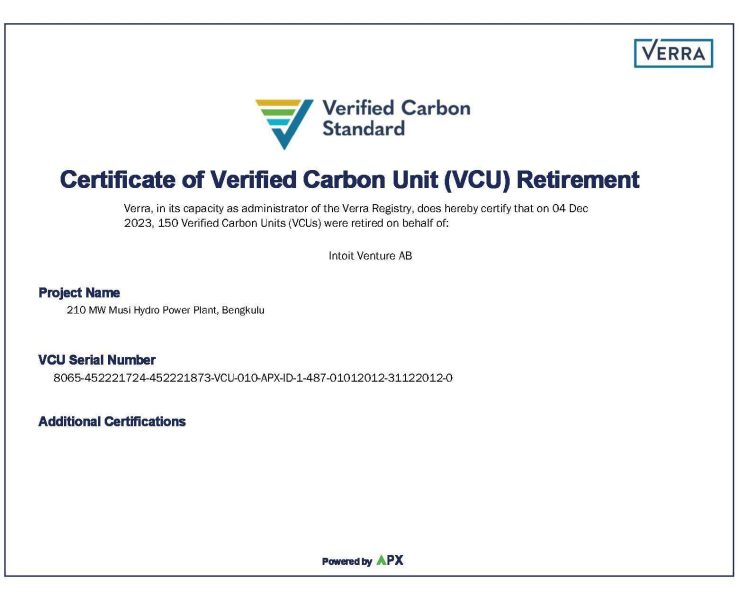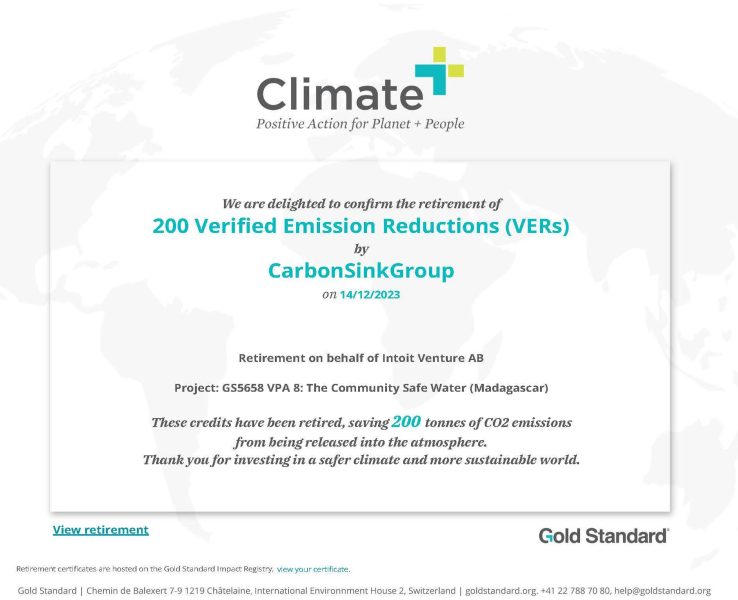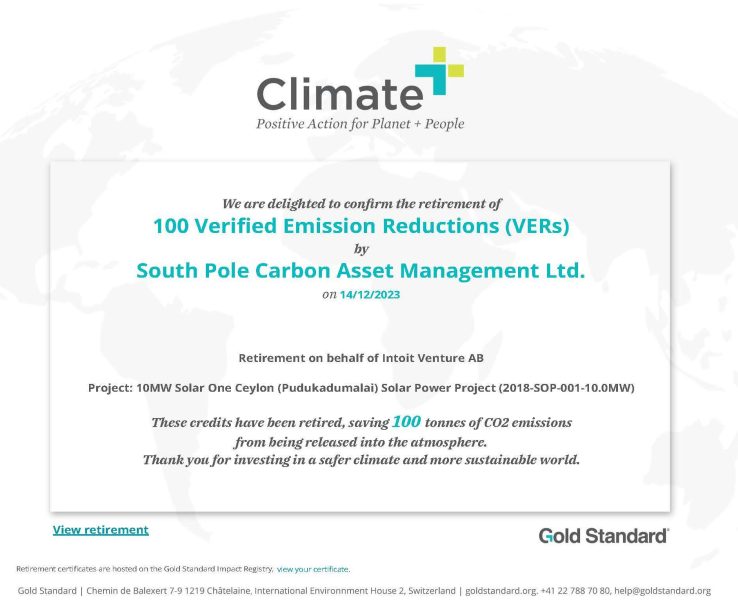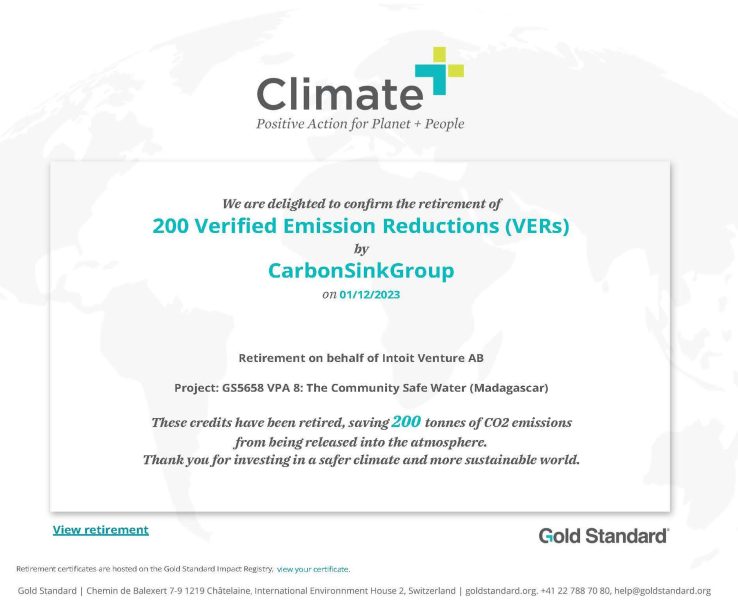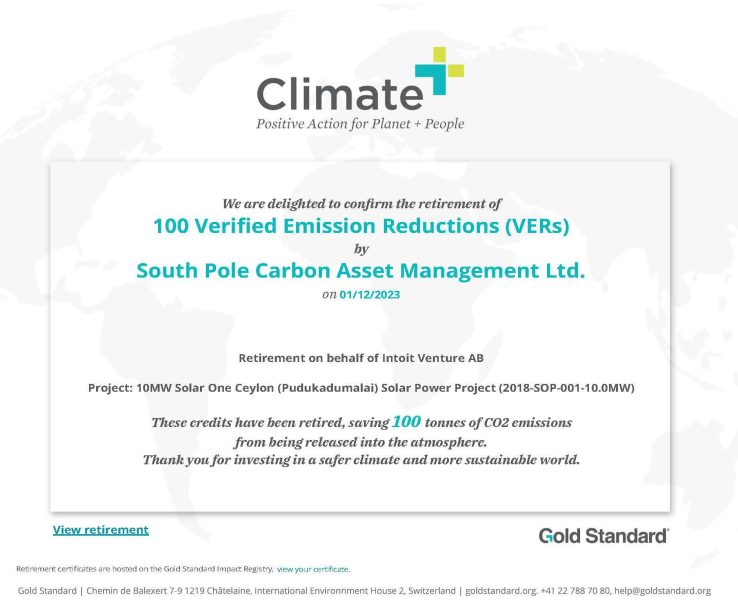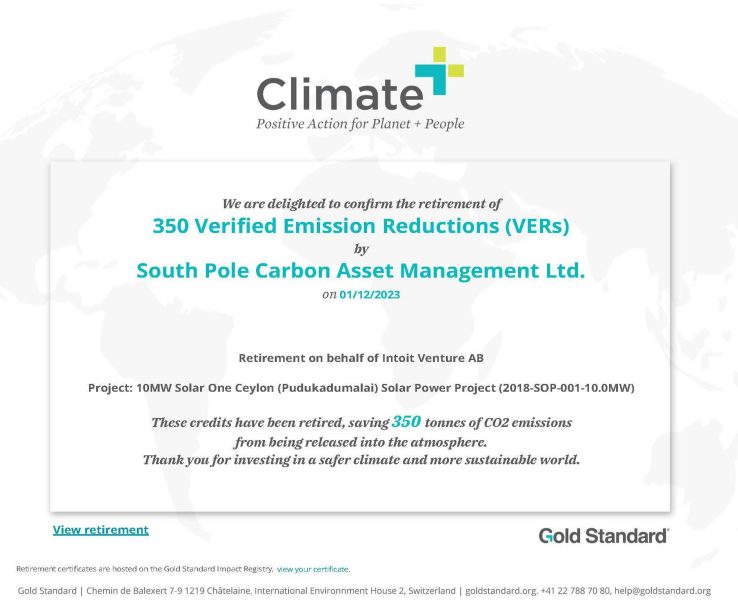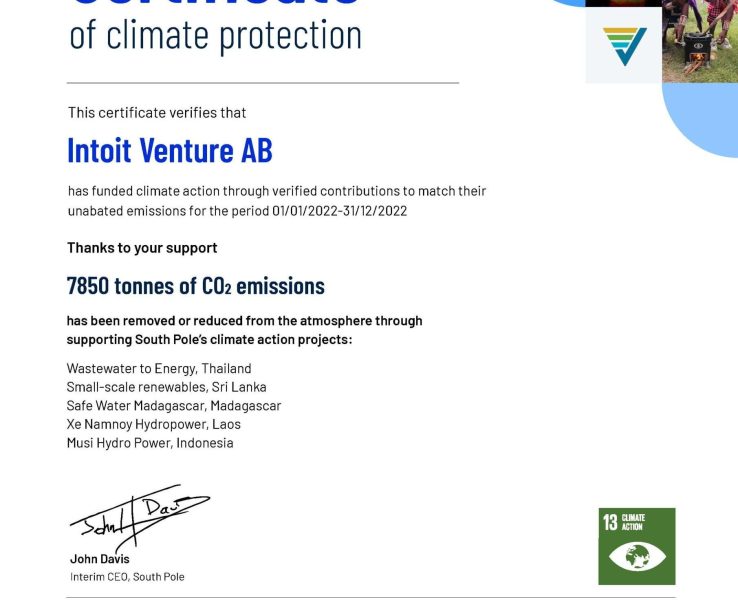SUSTAINABILITY
This is how the companies in the Intoit Travel Group work with Climate and Social Responsibility
Sedan 2017 är vår interna verksamhet helt klimatneutral och från januari 2019 ingår alltid klimatkompensation till 100% för alla våra kunders resor.
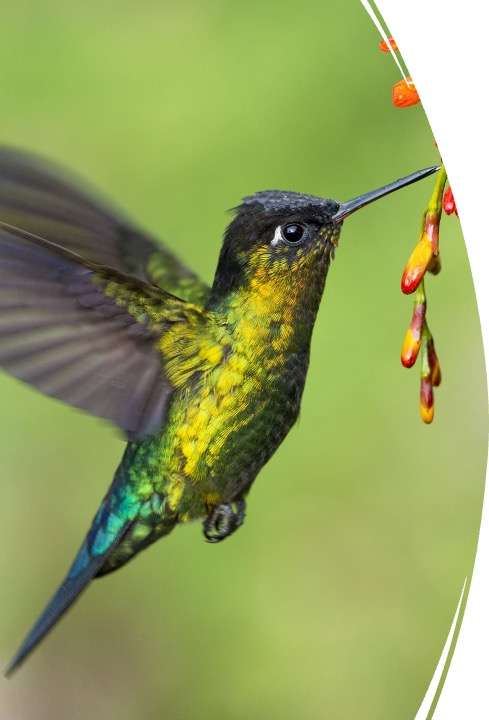
Investing in a clear conscience or in climate benefits?
How have we done?
We have listed everything in our company that contributes to CO2 emissions. Everything from our business trips by plane, car, train, bus, boat to all electricity in the office, heating, paper consumption, toner etc.
We have then let our partner in climate issues know this, south pole, recalculate to how many kilos of CO2 we caused.
To be on the safe side, we have added an additional 10% to this calculation. Subsequently, we have chosen to compensate for the climate in three projects, which are described below. They are carefully certified (Gold Standard), which means that thanks to our investment, the amount of CO2 is reduced by the same amount that we emit. The certification ensures, among other things, a that these measures would not have taken place without our investment.
So what do we do concretely?

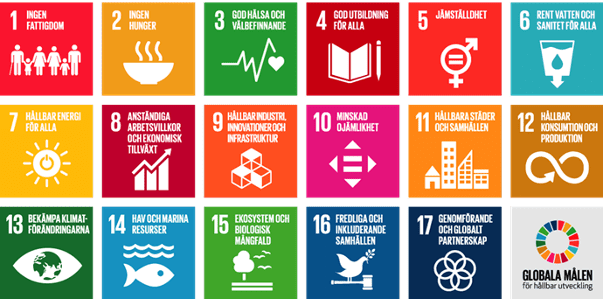
Agenda 2030
The goals must contribute to sustainable development that aims to
eradicate poverty, stop climate change and create peaceful and secure societies

Our sustainability projects
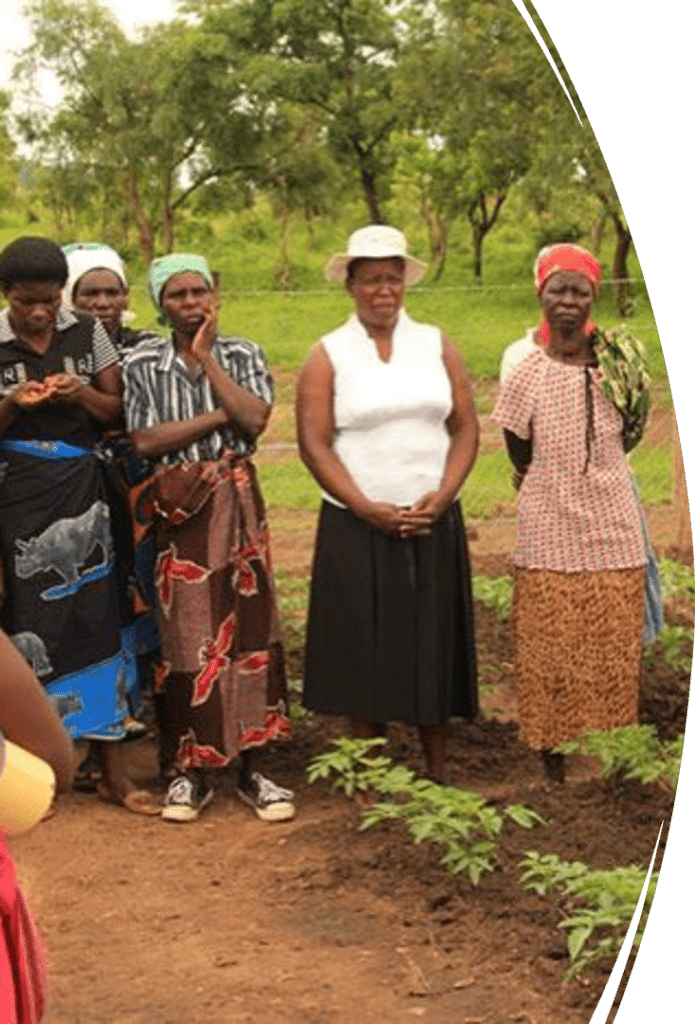
Small Scale Renewables
Trots att nästan 40% av Sri Lankas el kom från vattenkraft under 2017, så är landet fortfarande starkt beroende av fossila bränslen,och andelen kolbaserat bränsle i elproduktionen fortsätter att öka. Det stora beroendet av fossila bränslen fick allvarligakonsekvenser under 2022, då Sri Lanka drabbades av den värsta ekonomiska krisen på 70 år. Övergången till rena förnybaraenergikällor, i synnerhet solenergi, är avgörande för att framtidssäkra landets ekonomi och utrota energifattigdomen, som förnärvarande är utbredd i hela landet.
Sri Lanka har en stor potential för att producera förnybar energi, bland annat genom vind- och solkraft, vilket skulle kunna tillgodose landets energibehov. De flesta småskaliga sol- och vindkraftsprojekt är dock inte attraktiva för investerare på grund av lågavkastning. Tack vare frivillig klimatfinansiering möjliggörs småskaliga förnybara energiprojekt på Sri Lanka. Genom detta projektet har flera sol- och vindkraftsparker byggts vilket exporterar el till det nationella elnätet varje år, ersätter fossila bränslen och minskarde utsläpp som släpps ut när de annars förbränns.
Förutom minskade utsläpp bidrar projektet till ett mer resilient elnät och hållbar ekonomisk tillväxt på Sri Lanka. Projektet har skapat arbetstillfällen för lokala arbetstagare under parkernas bygg- och driftsfaser, samt permanent arbetskraft som erbjuder utbildningför kompensutveckling, vilket ökar kunskapen om förnybar teknik. En viktig social fördel som projekt bidrar med är den ökade stabila elförsörjningen till fattiga och utsatta samhällen på landsbygden. Genom en tryggad elförsörjning säkerställs det dagligabehovet av matlagning, belysning och uppvärmning.
Projektet bidrar till följande FN´s globala hållbarhetsmål: 4, 7, 8 & 13
Xe Namnoy Hydropower
Elproduktionen i Laos är inte tillräcklig och importerad el från utsläppsintensiva värmekraftverk från Thailand behöver användas. Detta projekt syftar till att öka Laos energimässigs självförsörjning vilket minskar behovet av importerad el.
Vattenkraftsprojektet ligger vid floderna Xe Nam Noy och Xe Katam, i den södra delen av Demokratiska folkrepubliken Laos, och nyttjar energin i strömmande vatten för att generera elektricitet. Projektet omfattar byggandet av 2 turbiner, vilket ger en totalinstallerad kapacitet på 15 MW.
Utöver att bidra till att tillgodose den inhemska efterfrågan på el, minskar även behovet av importerad el från Thailand, där elnätetdomineras av värmekraftverk. Genom att ersätta en del av den el som genereras av värmekraftverk minskar projektet de skadligautsläppen av växthusgaser. Projektet stöder den lokala ekonomin genom att skapa arbetstillfällen och utbildningsmöjligheter förlokalbefolkningen. I linje med bybornas önskemål har projektutvecklaren också byggt ett tempel och förbättrat vattenförsörjningen iområdet.
Projektet bidrar till följande FN´s globala hållbarhetsmål: 6, 7, 8 & 13
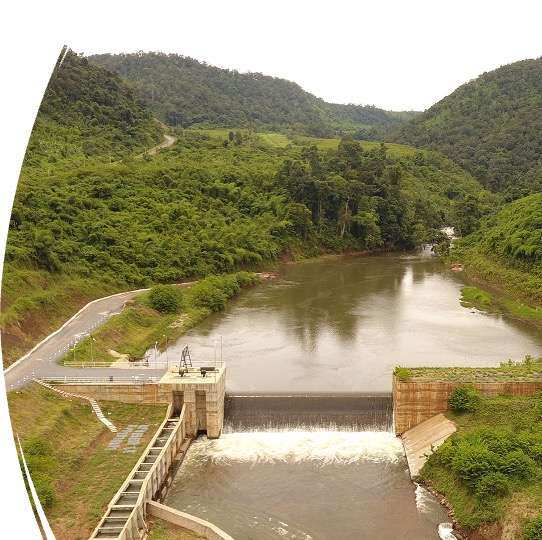
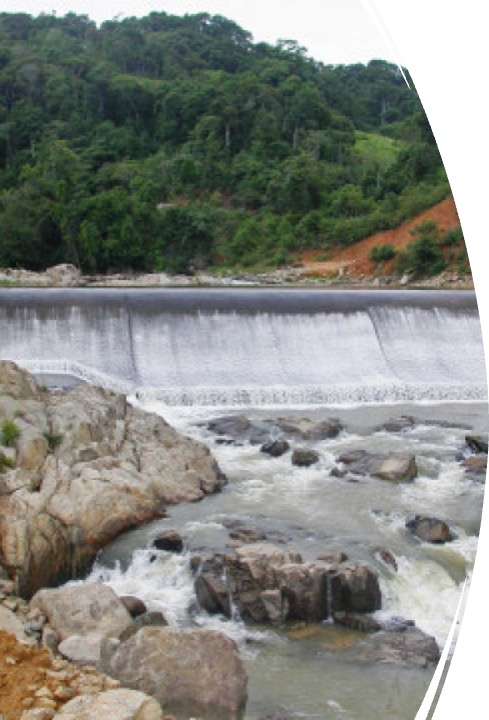
Musi River Hydro
Sumatra, Indonesiens största ö, är täckt av täta tropiska skogar som är hem för otaliga växt- och djurarter. Den bördiga jorden äridealisk för odling av ris och andra råvaror som kaffe, kakao, kanel och palmsocker. Trots detta begränsas nya ekonomiskamöjligheter av en outvecklad infrastruktur och begränsad tillgång till elektricitet. Det växande energibehovet hotar även Sumatras unika ekosystem.
Det nätanslutna vattenkraftverket är byggt vid floden Musi nära Sumatras hamnstad Bengkulu. Genom att nyttja rörelseenergin i det kraftigt strömmande vattnet har Musi River Hydro en total installerad kapacitet på 210 MW och levererar över 765 000 MWh tillSumatras elnät varje år. Detta är tillräckligt för att tillgodose elbehovet hos över 700 000 indonesier i genomsnitt varje år.
Projektet bidrar till en hållbar utveckling på Sumatras landsbygd, genom att t.ex. bidra till ökad tillgång till el samt skapa lokala arbetstillfällen med möjligheter till kompetensutveckling för lokalbefolkningen. En del av projektintäkterna återinvesteras ilokalsamhället och det har byggs ett barnhem, nya vägar, broar och en marknadsplats – vilket ger lokala bönder bättre tillgång att skaffa sig ytterligare inkomster. Ett program för återplantering av skog har också inrättats i det omgivande avrinningsområdet för att på så sätt skydda det naturligalandskapet.
Projektet bidrar till följande FN´s globala hållbarhetsmål: 7, 8, 9, 12, 13, & 15
Wastewater to Energy
För bara några år sedan levde invånarna i en thailändsk by i Huai Phueng-distriktet bland illaluktande avloppsvattenlaguner från en lokal stärkelsefabrik. För att ta hand om sitt överblivna avloppsvatten behandlade stärkelsefabriken avloppsvatten genom enserie kaskadformade öppna laguner. På grund av kombinationen av atmosfärisk temperatur, vattentemperatur och den storamängden avloppsvatten utvecklades en anaerob miljö i dammarna, vilket ledde till utsläpp av stora mängder metan – en växthusgassom är 25 gånger mer potent än CO2.
Projektet ligger i östra Thailand och omfattar rening av avloppsvatten från stärkelsefabriken i Huai Phueng-distriktet. I stället för attanvända öppna laguner för att rena avloppsvattnet har fabriken infört maskiner som kallas biodigesters, som återvinner metan frånfabriken och omvandlar det till biogas som kan återanvändas som energi i fabriken.
Projektet förhindrar inte bara utsläpp av växthusgaser från avloppsvatten – det ersätter dessutom fossil energi som förbrukas avfabriken, vilket minskar de globala utsläppen från flera håll. Lokala föroreningar minimeras, vilket har en positiv effekt på de lokala samhällenas försörjningsmöjligheter. Nya arbetstillfällen har skapats där det ingår kostnadsfria årliga medicinska kontroller för de anställda. Dessutom möjliggör projektetx och dess intäkter, stöd till social verksamhet och utbildning, t.ex. stipendier för lokalastudenter.
Projektet bidrar till följande FN´s globala hållbarhetsmål: 6, 7, 8 & 13


Community Safe Water
Ambanja-distriktet på Madagaskar kännetecknas av brist på tillgång till rent dricksvatten och endast 5% av befolkningen har direkt tillgång till detta. I projektområdet hämtas det mesta av vattnet från handgrävda brunnar. Eftersom grundvattennivån ligger mycketnära markytan, särskilt under regnperioden, är det vanligt med mikrobiologisk kontaminering.
Projektet syftar till att förbättra de hygieniska, sociala och ekonomiska förhållandena för lokalbefolkningen inom projektområdet.Detta görs genom att bygga soldrivna vattensystem för att säkerställa tillgången till rent dricksvatten för hushållsbruk i två byar (Ambatoaranana och Ankatafa).
Genom projektet implementeras lösningar som ger ökad tillgång till rent vatten samtidigt som koldioxidutsläpp reduceras dåförbrukningen av trä, som används för vattenkokning i reningssyfte, minskar. Genom att tillgången till rent vatten ökar, bidrar projektet även till att minska antalet vattenburna sjukdomar.
Projektet bidrar till följande FN´s globala hållbarhetsmål: 3, 5, 6, 12 & 13
En reflektion på vad som händer när vi inte reser
Ekonomi / sysselsättning påverkas. Drygt 10% av den Globala BNPn skapas inom turism.
Natur och djur skyddas inte. Detta blev tyvärr väldigt tydligt under Covid.
Det investeras mindre i kultur och konst.Turism utgör en viktig och ibland vital inkomstkälla for att museer, världsarv, kulturskatter, artister, konstnärer ska kunna finnas kvar.
Det blir mindre förståelse för andra kulturer när vi inte upplever dem i deras hemmiljö .
Bevarande av lokala kulturer blir mindre intressant när ingen visar intresse för det särpräglade.
Dictatorships become more isolated and citizens lose touch med omvärlden
